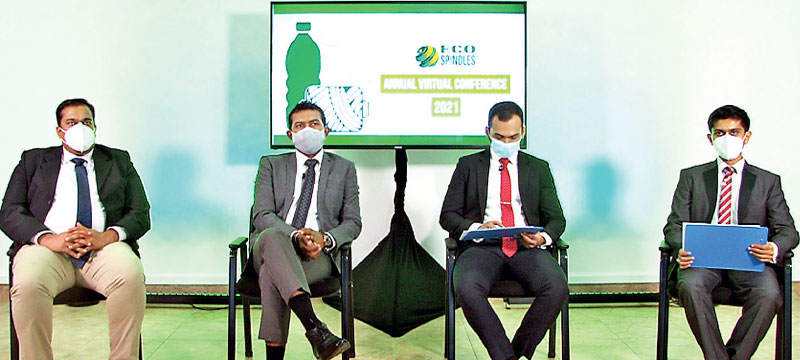Wednesday Feb 25, 2026
Wednesday Feb 25, 2026
Thursday, 17 February 2022 00:00 - - {{hitsCtrl.values.hits}}

From left: Yarns (Eco Spindles) Deputy General Manager Prashantha Malimbadage, Yarns (Eco Spindles) CEO Nalaka Senavirathna, Compere - Lithmal Jayawardhana, Yarns (Eco Spindles) Head of Sales Jerome de Mel
|
BPPL Holdings CEO and MD Dr. Anush Amarasinghe
|
Eco Spindles Ltd. Sri Lanka’s largest plastics recycler, has announced plans to expand its capacity to manufacture yarn using recycled plastics, as well as innovative new additions to its suite of cutting-edge, eco-friendly products used by some of the world’s leading fashion brands.
The company owns one of only two plants in the world capable of creating polyester yarn directly from recycled polyethylene terephthalate (PET) plastic flakes. After the completion of the second phase of its yarn plant expansion program in April 2022, the company expects its capacity to manufacture recycled polyester yarn to increase by 120%, from 100 tonnes of Draw Textured Yarn a month to 220 tonnes a month.
For its third phase of expansion, Eco Spindles is exploring potential opportunities to expand its footprint within or beyond Sri Lanka.
Given that its products, made using recycled PET plastics, are primarily exported, these developments pave the way for the company to generate more export earnings and foreign exchange for Sri Lanka. It also addresses the improper disposal of plastics, one of the world’s biggest environmental issues.
These developments were announced at Eco Spindles’ annual yarn conference held virtually on the 14 February 2022, with the participation of the company’s senior management. During the conference, Eco Spindles also felicitated its top 10 buyers of 2021.
The conference featured keynote addresses from BPPL Holdings PLC Managing Director and Chief Executive Officer (CEO) Dr. Anush Amarasinghe, Eco Spindles Yarns CEO Nalaka Senavirathna and Eco Spindles Yarns Head of Sales Jerome De Mel. In addition to plans for business improvement, the speakers also shared their insights into the ongoing battle against plastic pollution and offered promising solutions adopted on a national scale with global impact.
“As people who are passionate about the environment, we are painfully aware of the impact plastic materials have on nature since more than 583 billion PET plastic bottles are produced each year with 85% of it going to landfills. We also believe that to resolve this crisis, the solution is social entrepreneurship which seeks to create and support a circular economic model. It is from this understanding that Eco Spindles emerged, and we are fortunate that our customers and partners have supported us in this vital mission. We look forward to continuing to collaborate with them in the future,” Dr. Amarasinghe said.
Eco Spindles also announced plans to manufacture recycled polyester yarn using textile waste during the conference. The company has been working closely and trailing this innovation with leading apparel manufacturers in Sri Lanka and global apparel brands. The first commercially viable product will be launched in May 2022.
“Globally, only 20% of clothing waste is recycled or reused, while the remaining 80% is incinerated or in landfills. Given that Sri Lanka is a prolific exporter of apparel, the ability to recycle textile waste back to yarn will provide the domestic industry and its global brands and retail partners a significant boost in enhancing their sustainability efforts. Additionally, a PET bottle, which typically takes over 1,000 years to degrade in the environment, can be recycled into polyester yarn, which manufacturers later convert into garments. Through this conversion, we remove over 900 years in degradation time if we responsibly dispose of and recycle plastic,” Nalaka Senavirathna said.